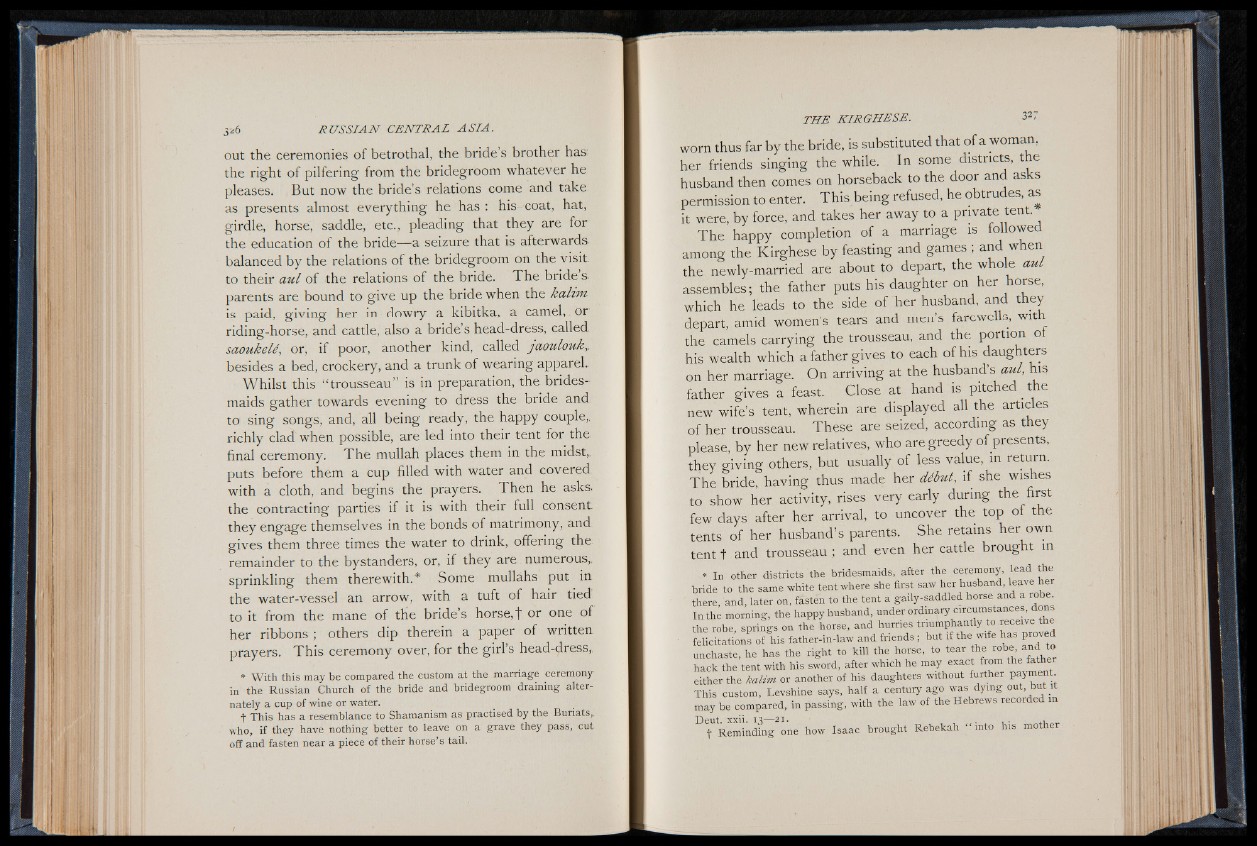
out the ceremonies of betrothal, the bride’s brother has'
the right of pilfering from the bridegroom whatever he
pleases. But now the bride’s relations come and take
as presents almost everything he has : his coat, hat,
girdle, horse, saddle, etc., pleading that they are for
the education of the bride— a seizure that is afterwards,
balanced by the relations of the bridegroom on the visit
to their aul of the relations of the bride. The bride’s,
parents are bound to give up the bride when the kalim
is paid, giving her in dowry a kibitka, a camel,. or
riding-horse, and cattle, also a bride’s head-dress, called.
saouketi, or, if poor, another kind, called jaoulouk,.
besides a bed, crockery, and a trunk of wearing apparel..
Whilst this “ trousseau” is in preparation, the bridesmaids
gather towards evening to dress the bride and
to sing songs, and, all being ready, the happy couple,,
richly clad when possible, are led into their tent for the
final ceremony. The mullah places them in the midst,,
puts before them a cup filled with water and covered
with a cloth, and begins the prayers. Then he asks,
the contracting parties if it is with their full consent
they engage themselves in the bonds of matrimony, and
gives them three times the water to drink, offering the.
remainder to the bystanders, or, if they are numerous,,
sprinkling them therewith.* Some mullahs put in
the water-\iessel an arrow, with a tuft of hair tied
to it from the mane of the bride’s horse, j" or one of
her ribbons ; others dip therein a paper of written
prayers. This ceremony over, for the girl’s head-dress,,
* With this may be compared the custom at the marriage ceremony
in the Russian Church of the bride and bridegroom draining alternately
a cup of wine or water.
t This has a resemblance to Shamanism as practised by the Buriats,,
who, if they have nothing better to leave on a grave they pass, cut
off and fasten near a piece of their horse’ s tail.
worn thus far by the bride, is substituted that of a woman,
her friends singing the while. In some districts, the
husband then comes on horseback to the door and asks
permission to enter. This being refused, he obtrudes, as
it were, by force, and takes her away to a private tent.
The happy completion of a marriage is fo owe
among the Kirghese by feasting and games ; and when
the newly-married are about to depart, the whole aul
assembles; the father puts his daughter on her horse,
which he leads to the side of her husband, and they
depart, amid women’s tears and men’s farewells, with
the camels carrying the trousseau, and the portion ot
his wealth which a father gives to each of his daughters
on her marriage. On arriving at the husband’s aul, his
father gives a feast. Close at hand is pitched the
new wife’s tent, wherein are displayed all the articles
of her trousseau. These are seized, according as they
please, by her new relatives, who are greedy of presents,
they giving others, but usually of less value, in return.
The bride, having thus made her début, if she wishes
to show her activity, rises very early during the first
few days after her arrival, to uncover the top of the
tents of her husband’s parents. She retains her own
tent t and trousseau ; and even her cattle brought in
* In other districts the bridesmaids, after the ceremony, lead the
bride to the same white tent where she first saw her husband, leave her
there and, later on, fâsten to the tent a gaily-saddled horse and a robe.
In the morning, the happy husband, under ordinary circumstances, dons
the robe, springs on the horse, and hurries triumphantly to receive the
felicitations of his father-in-law and friends ; but if the wife has prove
unchaste, he has the right to kill the horse, to tear the r o b e a n d to
hack the tent with his sword, after which he may exact from the fathe
either the kalim or another of his daughters without further payment
This custom, Levshine says, half a century ago was dying out, but it
may be compared, in passing, with the law of the Hebrews recorded
Deut. xxii. 13 21. t> iroin << infir» Viis mother